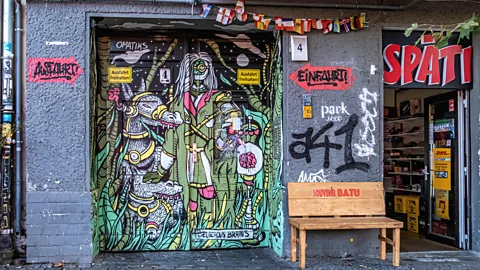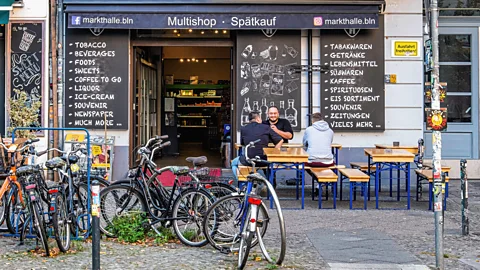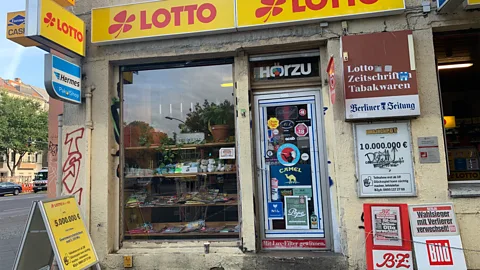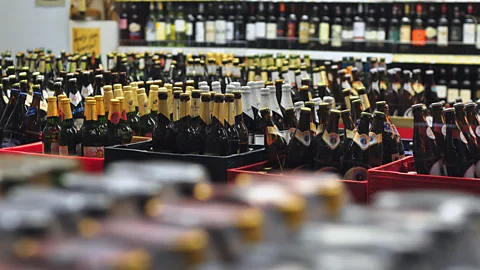Spätis: The convenience stores that rule Berlin
 Eden Breitz/Alamy
Eden Breitz/AlamyA relic of the former East , these "late shops" are located on most every street and are as "Berlin" as techno.
New York City has its bodegas, Paris its tabacs, and Berlin its Spätis. Formally known as a Spätkauf, which translates-ish to "late shop," a späti can be found on most blocks in the city and is open late into the night – if not all night. They supply locals and tourists with cigarettes, snacks and €1 after-work wegbiers ("beers you drink on the go"). But during the pandemic, and particularly during the warmer months, they became essential fuelling stations for outdoor gatherings, as shuttered bars and nightclubs turned social life inside out.
Much like 's boulangeries and wine and cheese shops, which were deemed "indispensable for the continuity of the life of the nation", Berlin's spätis were also considered essential and allowed to stay open during the pandemic's hard lockdown. According to the city's official website, there are around 1,000 spätis in Berlin's central districts, and like the city's Bäckereien (bakeries), they seem to be found on almost every street. Their density is so prolific that you wonder how each manages to stay in business selling the same things: colourful bags of Haribo gummies, Ritter Sport's square-shaped chocolate bars, shampoo forgotten during the day's errands.
But look a little closer and each späti, often owned by immigrants to Berlin, has its own personality – one that's a reflection of its owner, clientele and location within the city. While the basic selection of goods tends to remain the same, there are those that differentiate themselves based on the preferences of locals in their kiez, or the neighbourhood in the immediate blocks around them.
 Eden Breitz/Alamy
Eden Breitz/Alamy"It has been a niche for immigrant and ethnic populations to run a business and also to run a business that caters particularly to their own people, their own ethnicities," said Dr Paul Nolte, a historian at Freie Universität Berlin. "So, there will be a Turkish späti that caters to Turkish immigrants in Berlin and so on."
Near my home in the heavily Turkish neighbourhood of Neukölln, for example, most spätis stock Uludağ Gazoz, a fizzy Turkish lemonade, and little tubs of Turkish-style ayran, a yoghurt-based beverage. If it's in a particularly touristy spot, spätis might also sell "I <3 Berlin" T-shirts, postcards and shot glasses.
In other kiezes, some spätis have disco lights; others, reportedly, have drag queens. One, in the central neighbourhood of Mitte, is only open Thursdays through Sundays and hosts jazz nights, cementing itself as a fixture for locals' social lives.
"My local, the 'techno-späti' was the only place to grab a beer and feel a bit of normality during lockdown," said Charly Machin, who lives near the airport-turned-public park Tempelhofer Feld. "The music is often so loud that they have to basically shout the price at you over the music. It has lights and a disco ball over the fridges."
 Eden Breitz/Alamy
Eden Breitz/AlamyA späti and its kiez work in tandem, each ing the other – it's no wonder many Berliners have a bit of a soft spot for their local outpost. "This is important in Berlin: it has this community and neighbourhood component. It's close by and it's in walking distance, and with the supermarkets getting ever larger, it means that there are fewer of them," said Nolte.
"When everyone streams out of the Templehofer Feld at night, they disperse into all the local spätis," said Machin. Her techno outpost is her hands-down favourite: "They know everyone which is great, but they also all the times you were a drunken idiot."
You may also be interested in:
• Why Germans love getting naked in public
The business' late hours also give spätis a "particularly German emphasis", adds Nolte. "Opening hours of stores have historically been very restricted in , which leads us to the very name of the thing, the späti, that it's late opening hours."
When Nolte was growing up in West , "All grocery stores and shops were mandated to close by 6:30pm and on Saturdays by 1 or 2pm," he said. While that's no longer the case – grocery stores are now usually open until at least 21:00, minus the usual Sunday closure – this is "part of the origins of the späti, and it still plays a role, because the next-door Rewe [supermarket] might be closed when you need something at 10:30 in the night, and the späti next door is still open and will serve you."
 Krystin Arneson
Krystin ArnesonSpätis' origins date back to 1950 when "Spätverkaufsstellen" (literally: "late outlets"), opened to start serving late-night workers in the former East German communist state when their shifts ended. According to the Berliner Zeitung newspaper, more than 100 such stores dotted Berlin before the fall of the Berlin Wall – but they were only located in the East. In the West, those seeking a late-night beer or cigarettes would need to drive to a gas station, and it was only once the city reunified that modern-day spätis began to appear everywhere. Today, while the concept of a late shop exists in other areas of , it's this history that makes them uniquely Berlin.
But spätis also provide something else for their customers, which is belied by the wobbly (but somehow indestructible) wood-topped tables and benches outside – and sometimes inside – their doors. For Berliners, spätis have a social function as a place to chat with friends over beers, soft drinks or coffees purchased inside. Due in part to the fact they're cheaper than bars, they're also an egalitarian spot: It's possible to find everyone from old East German construction workers, expat American start-up bros and college students to Tinder dates, groups of Turkish girls, and British stag parties on the benches outside of the same one.
Right off Mitte's Rosenthaler Platz, Rosenback Kiosk boasts a prime location next to a busy U-Bahn subway line and Volkspark am Weinberg, a park popular for meeting friends and ing an afternoon stretched out on the grass with some cold Berliner Kindl pilsner. Open 24 hours, it serves fresh buns and pastries to morning commuters. At night, though, it transforms. It's what's known as a "party späti" and functions almost like a bar: it's a destination for friends to meet and for drinks to be drunk. On weekend nights, tables of Berliners and visitors sitting elbow to elbow spill onto the sidewalk outside its entrance. Inside, there's a constant queue at the inside for more beers, more Fritz-kolas ('s answer to Coca-Cola), more pouches of tobacco.
Another well-known club, Melancholie 2, is accessed via a späti's refrigerator door in Mitte, begging the question of whether it's a späti-club or club-späti.
During the pandemic, when it wasn't possible to drink in loitering clusters outside spätis or bars selling takeaway drinks, spätis also became a place that sustained what remained of Berliners' legendary nightlife. With bars and clubs closed, Berliners would stock up on späti drinks and take them to the places they still could congregate to make their own parties – essentially parks, the banks of the Landwehr Canal and roaming strolls around town.
 ullstein picture/Getty Images
ullstein picture/Getty ImagesLike most parks in Berlin, Hasenheide is also bordered with spätis to refresh groups of people picnicking on its grassy fields – an activity that was legal or at least tolerated during most of the warm-weather days throughout the pandemic – or ravers gathering under the cover of night (which was not as legal or tolerated). The park became notorious for illegal techno raves that drew thousands of people during the wee hours, as many as 5,000 in one night last summer.
In his father's store near Hasenheide Park, 17-year-old Ali Jaddouh said that working in a späti is less about the partiers and more about the connection with the bustling kiez around him. "The whole neighbourhood comes over here and buys stuff. We know the people. They live here in front of us. They know my name," he said. "A neighbourhood isn't a neighbourhood without the späti."
more than three million BBC Travel fans by liking us on Facebook, or follow us on Twitter and Instagram.
If you liked this story, sign up for the weekly bbc.com features newsletter called "The Essential List". A handpicked selection of stories from BBC Future, Culture, Worklife and Travel, delivered to your inbox every Friday.
{"image":{"pid":""}}
